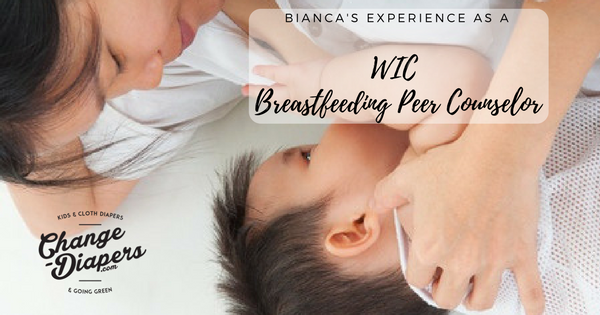
Growing up I have many memories of my mother going to the local health department when we lived in Long Beach and our family receiving WIC services. The Special Supplemental Nutrition Program for Women, Infants and Children (WIC) is a federal assistance program of the Food and Nutrition Service (FNS) of the United States Department of Agriculture (USDA) for healthcare and nutrition of low-income pregnant women, breastfeeding women, and infants and children under the age of five. (Source: https://en.wikipedia.org/wiki/WIC).
When I found out I was pregnant with our first in 2011, signing up for WIC was one of the first things I did. Although my husband and I, actually boyfriend at the time, were together, we were not legally married. He had a steady part-time job, and I had a minimum wage job working at a local grocery store. Both first-time parents, there was a lot we had to learn and figure out. Thankfully my mother urged me to sign up for WIC. And it was one of the best things that I would ever do.
The Breastfeeding Peer Counselor Initiative was launched in 2004; women with breastfeeding experience became counselors for women learning how to breastfeed. I was asked at the WIC office if I was planning to breastfeed and I automatically said yes. I think even before I signed up for WIC I knew that I wanted to breastfeed. At that point, my WIC office did not yet have the Breastfeeding Peer Counselor (BFPC) program in action. Although it was in place at many different clinics around the country.
My son Emilio was born in August of 2011, one month early of his September due date and the weekend of his baby shower! He was born on a Thursday, the baby shower was that Saturday. It was a whirlwind! Our hospital stay was a little longer than expected because of high jaundice levels that he had. We had a rough start with breastfeeding, but I was determined to breastfeed no matter what. Thankfully the nurses and the lactation consultant were a big help, and although he did have jaundice, formula was never aggressively pushed on us. I left the hospital with a nipple shield and a lot of information. However when we got home, we still struggled. Engorgement, oversupply, pumping problems, still using the nipple shield, mastitis. Some days I just wanted to give up. The first couple of months were the hardest. Around month 3, things finally settled down and we got the hang of things. Breastfeeding was going great and it felt amazing nourishing my son with milk my body was making specifically for him. I went on to breastfeed Emilio for 3 years!
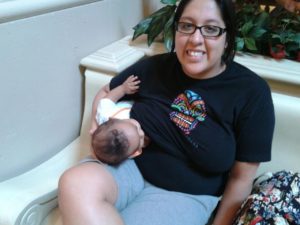
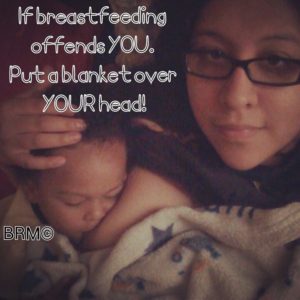
May 4th 2012 June 10th 2013
Fast-forward a couple of years to 2014 and I was getting ready to give birth to my second child. I was still receiving WIC at that time for Emilio who was 3 years old, and I re-certified WIC services for myself since I was pregnant. My WIC office did have a BFPC program set up at this time, but for some reason, I was not referred or signed up for it. I feel like I was super informed on breastfeeding this time around and I was ready to breastfeed our newest addition. I had found a lot of online breastfeeding support, but not much locally, it was something that I was hoping to find one day. Local breastfeeding support.
Lucy was born in June 2014, full-term at around 41 weeks. Healthy baby, and healthy mommy. Breastfeeding was smooth and with no complications. Everything was great. I was a stay at home mom by now and I spent a lot of time online with my breastfeeding and cloth diaper support groups. Every time I’d go for a WIC appointment I would ask about volunteering to help other moms in my area breastfeed. At one point I ended up going to a baby fair at the hospital where I had previously given birth to my children; the hospital LC was there and so was the BFPC from the health department. We all met for the first time and hit it off right from the start. I finally found the local support that I had been longing for.
On September 3rd 2014 the WIC director called and asked me if I was interested in joining their WIC Team and become a breastfeeding peer counselor. I was freaking out! As a WIC client and a breastfeeding mother, this was the opportunity I had been waiting for!
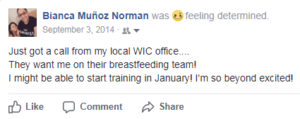
Who are Breastfeeding Peer Counselors and What Do They Do?
Peer counselors are mothers who have personal experience with breastfeeding and are trained to provide basic breastfeeding information and support to other mothers with whom they share various characteristics, such as language, race/ethnicity, and socioeconomic status. Peer counselors reinforce breastfeeding recommendations in a socially and culturally appropriate context, and promote breastfeeding as an important element in the healthy development of the mother and baby.
In WIC, peer counselors are recruited and hired from WIC’s target population of low-income women and undergo training to provide mother-to-mother support in group settings and one-to-one counseling through telephone calls or visits in the home, clinic, or hospital. Source: https://lovingsupport.fns.usda.gov/content/about-wic-breastfeeding-peer-counseling
I started training in March of 2015, and by May 2015 I was officially a Breastfeeding Peer Counselor.
https://www.instagram.com/p/2JxyhykzFk/
I was doing home visits, hospital visits. I was seeing clients at the office. Planning monthly support group meetings. Working from home and making phone calls. I was even able to help Spanish speaking families since I am bi-lingual. I met so many amazing babies and families on my BFPC journey. As a Woman of Color, having two babies of my own and knowing the racial and ethnic disparities in breastfeeding, this part of my life will always and forever be important. Learn more: Racial and Ethnic Disparities in Breastfeeding
https://www.instagram.com/p/7syrW-kzGU/
In July of 2016, I was offered a full-time position at my current job. This was also an opportunity I could not pass up. Up until recently, my family and I had been considered a low-income family. We received several types government-funded help over the years: Medicaid, Food Nutritional Services (food stamps) and WIC. However, with the guarantee of this full-time position, we knew that we could make it without the additional services our county had provided. To this day I miss being a BFPC and working at the Health Department tremendously. I currently work at a local non-profit where I have been able to help many families as well. I love working in my community and hope that I making a difference.
Have you ever signed up for WIC? What was your experience like? Any fellow BFPC’s around?



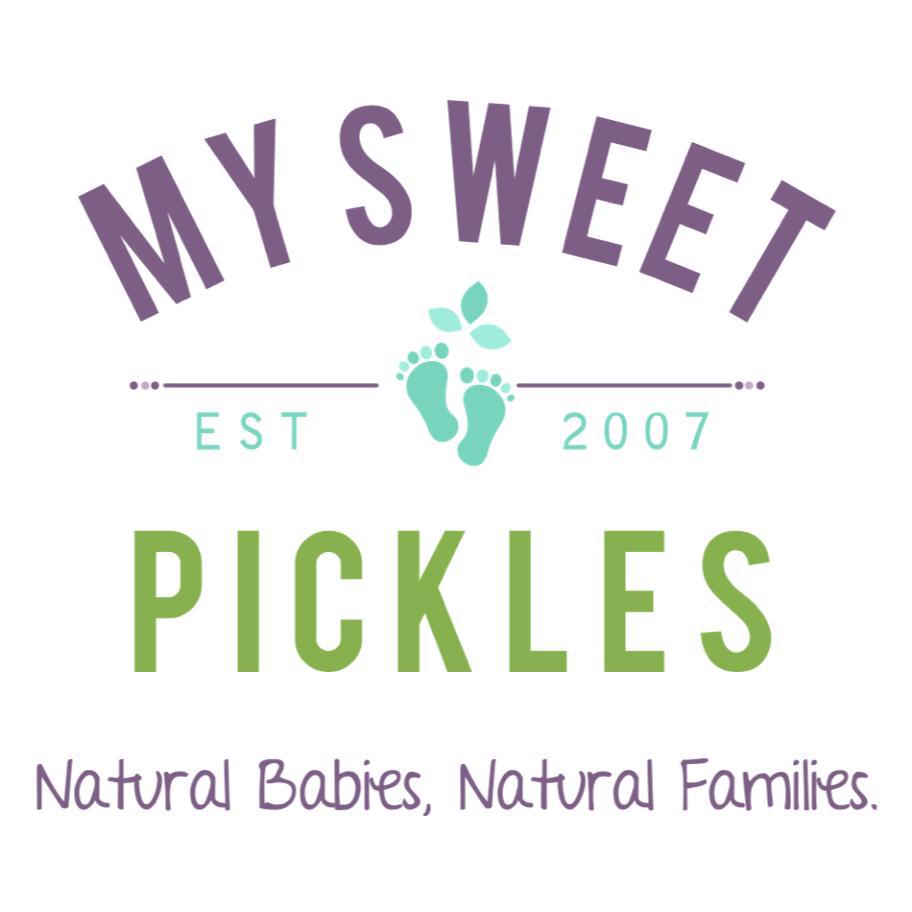





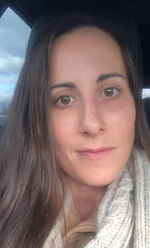 Maria wants to live in a world where cloth diapers are the norm and moms can make parenting choices without judgement. When she’s not chasing her 18, 14 and 11-year old kids around, you might find her checking out the latest gadgets, organizing something (again) or exercising in the fresh air.
Maria wants to live in a world where cloth diapers are the norm and moms can make parenting choices without judgement. When she’s not chasing her 18, 14 and 11-year old kids around, you might find her checking out the latest gadgets, organizing something (again) or exercising in the fresh air. 






